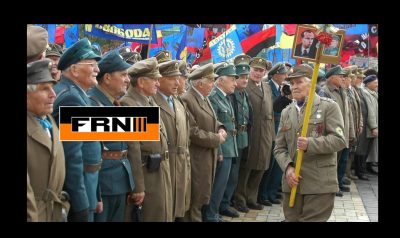Major: Ukraine Enacts Pro-Nazi Legislation, WWII Era Nazi Collaborators Given Veteran Status, Pensions

In Ukraine a law on the recognition of members of military operations of nationalist organizations as ‘veterans’, including those of the Ukrainian Insurgent Army (UPA), who fought in support of the Hitler-led German Nazy effort banned in Russia, came into force.
Previously, only UPA militants who participated in hostilities against the Nazi invaders in 1941-1944 fell into this category. The UPA generally collaborated with the German military, and after 1943 found themselves in skirmishes against the Nazi front. Under the new legislation, UPA members who fought alongside the German military will now qualified for a number of veteran’s benefits.
Under the new law, participants of the UPA will qualify for about 20 benefits, including the payment of utilities and free travel in public transport, as well as medical care and the provision of medicines. All of them in accordance with the law “On the legal status and memory of fighters for the independence of Ukraine in the XX century” are recognized as fighters for the independence of the country.
The relevant law was adopted by deputies of the Verkhovna Rada on December 6th, 2018. On December 22, it was signed byPresident of Ukraine Petro Poroshenko, and was planned to come into effect today, as elections loom where Poroshenko stands on very shaky ground.
The UPA was formed in October 1942 as the militant wing of the organization of Ukrainian nationalists. Its activities were primarily in Western Ukraine and fought against the Soviet troops, and were known for their cooperating with the Nazis.
The UPA-OUN continued on with a guerrilla war against Soviet authorities until 1949, and against the People’s Republic of Poland until around the same time. The UPA was known for its campaign of ethnic cleansing against Poles. For this reason, Polish ultra-nationalists and Ukrainian and Galician ultra-nationalists have a difficult time seeing eye to eye on this historical matters of import. This has frustrated Atlanticist plans to use ultra-nationalists to support the creation of a ‘third pole’, a wide land-mass curtain separating Russia from Central and Western Europe, so to frustrate the inevitable rise of Eurasian integration.
*
Note to readers: please click the share buttons below. Forward this article to your email lists. Crosspost on your blog site, internet forums. etc.

